HSBC's Financial Globalization Strategies Post-Brexit
VerifiedAdded on 2020/04/21
|13
|2821
|127
AI Summary
The provided references offer a comprehensive insight into HSBC's strategic initiatives in human resource management (HRM) and international business. Specifically, they explore how HSBC leverages learning and development to maintain a competitive edge globally. The discussion on Brexit highlights its significant impact on HSBC’s market position and economic strategy, necessitating operational adjustments. Additionally, the analysis of diversity solutions within multinational corporations showcases practical approaches to fostering inclusivity. Strategic HRM is examined through the lens of international expansion, emphasizing resource allocation and institutional alignment. Lastly, financial globalization strategies post-Brexit are scrutinized for their role in sustaining HSBC's global operations amidst evolving economic landscapes.

Running head: HRM IN BANKING INDUSTRY IN BRITAIN
HRM in Banking Industry in Britain
Name of the Student:
Name of the University:
Author Note:
HRM in Banking Industry in Britain
Name of the Student:
Name of the University:
Author Note:
Paraphrase This Document
Need a fresh take? Get an instant paraphrase of this document with our AI Paraphraser
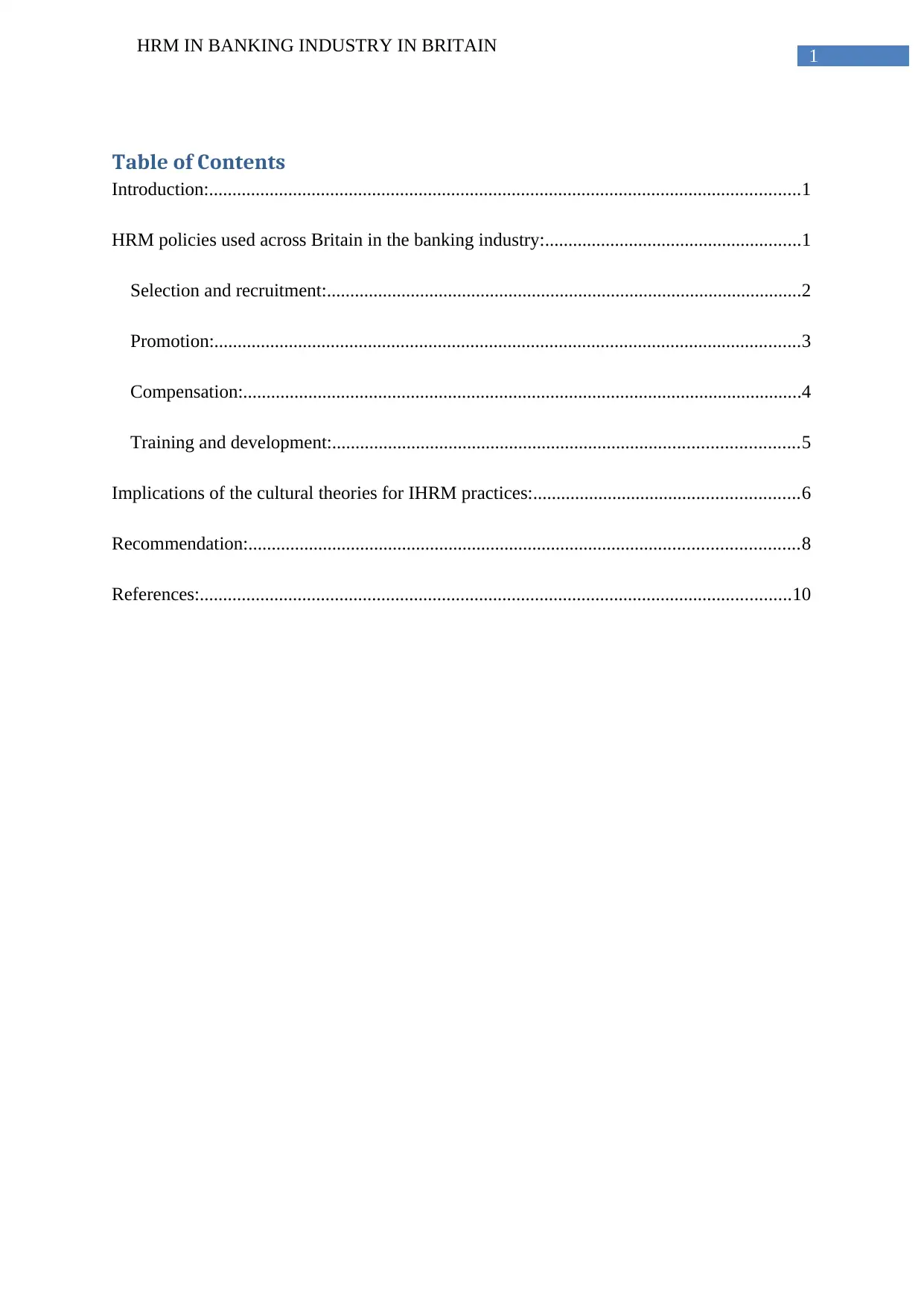
1
HRM IN BANKING INDUSTRY IN BRITAIN
Table of Contents
Introduction:...............................................................................................................................1
HRM policies used across Britain in the banking industry:.......................................................1
Selection and recruitment:......................................................................................................2
Promotion:..............................................................................................................................3
Compensation:........................................................................................................................4
Training and development:....................................................................................................5
Implications of the cultural theories for IHRM practices:.........................................................6
Recommendation:......................................................................................................................8
References:...............................................................................................................................10
HRM IN BANKING INDUSTRY IN BRITAIN
Table of Contents
Introduction:...............................................................................................................................1
HRM policies used across Britain in the banking industry:.......................................................1
Selection and recruitment:......................................................................................................2
Promotion:..............................................................................................................................3
Compensation:........................................................................................................................4
Training and development:....................................................................................................5
Implications of the cultural theories for IHRM practices:.........................................................6
Recommendation:......................................................................................................................8
References:...............................................................................................................................10
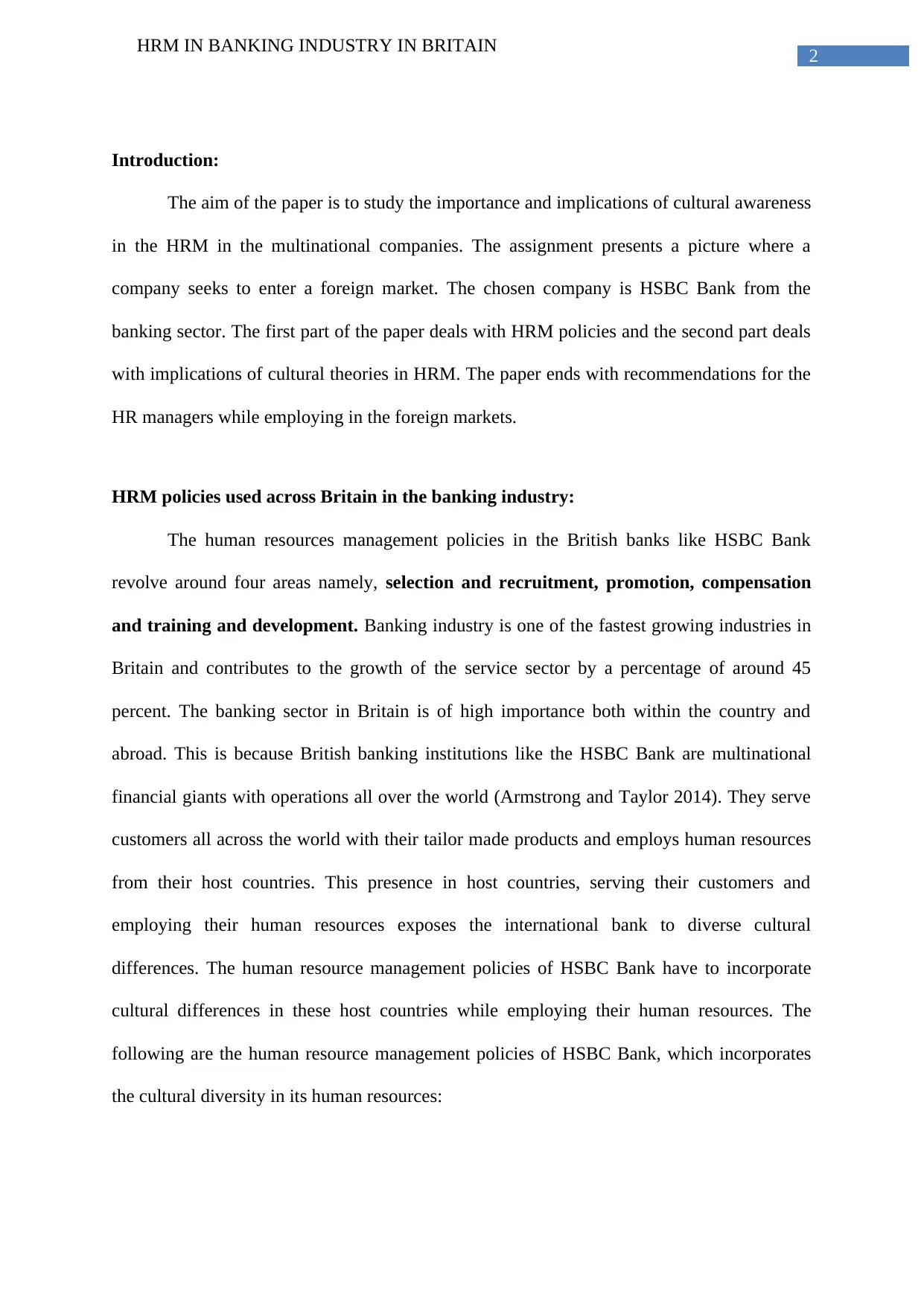
2
HRM IN BANKING INDUSTRY IN BRITAIN
Introduction:
The aim of the paper is to study the importance and implications of cultural awareness
in the HRM in the multinational companies. The assignment presents a picture where a
company seeks to enter a foreign market. The chosen company is HSBC Bank from the
banking sector. The first part of the paper deals with HRM policies and the second part deals
with implications of cultural theories in HRM. The paper ends with recommendations for the
HR managers while employing in the foreign markets.
HRM policies used across Britain in the banking industry:
The human resources management policies in the British banks like HSBC Bank
revolve around four areas namely, selection and recruitment, promotion, compensation
and training and development. Banking industry is one of the fastest growing industries in
Britain and contributes to the growth of the service sector by a percentage of around 45
percent. The banking sector in Britain is of high importance both within the country and
abroad. This is because British banking institutions like the HSBC Bank are multinational
financial giants with operations all over the world (Armstrong and Taylor 2014). They serve
customers all across the world with their tailor made products and employs human resources
from their host countries. This presence in host countries, serving their customers and
employing their human resources exposes the international bank to diverse cultural
differences. The human resource management policies of HSBC Bank have to incorporate
cultural differences in these host countries while employing their human resources. The
following are the human resource management policies of HSBC Bank, which incorporates
the cultural diversity in its human resources:
HRM IN BANKING INDUSTRY IN BRITAIN
Introduction:
The aim of the paper is to study the importance and implications of cultural awareness
in the HRM in the multinational companies. The assignment presents a picture where a
company seeks to enter a foreign market. The chosen company is HSBC Bank from the
banking sector. The first part of the paper deals with HRM policies and the second part deals
with implications of cultural theories in HRM. The paper ends with recommendations for the
HR managers while employing in the foreign markets.
HRM policies used across Britain in the banking industry:
The human resources management policies in the British banks like HSBC Bank
revolve around four areas namely, selection and recruitment, promotion, compensation
and training and development. Banking industry is one of the fastest growing industries in
Britain and contributes to the growth of the service sector by a percentage of around 45
percent. The banking sector in Britain is of high importance both within the country and
abroad. This is because British banking institutions like the HSBC Bank are multinational
financial giants with operations all over the world (Armstrong and Taylor 2014). They serve
customers all across the world with their tailor made products and employs human resources
from their host countries. This presence in host countries, serving their customers and
employing their human resources exposes the international bank to diverse cultural
differences. The human resource management policies of HSBC Bank have to incorporate
cultural differences in these host countries while employing their human resources. The
following are the human resource management policies of HSBC Bank, which incorporates
the cultural diversity in its human resources:
⊘ This is a preview!⊘
Do you want full access?
Subscribe today to unlock all pages.

Trusted by 1+ million students worldwide
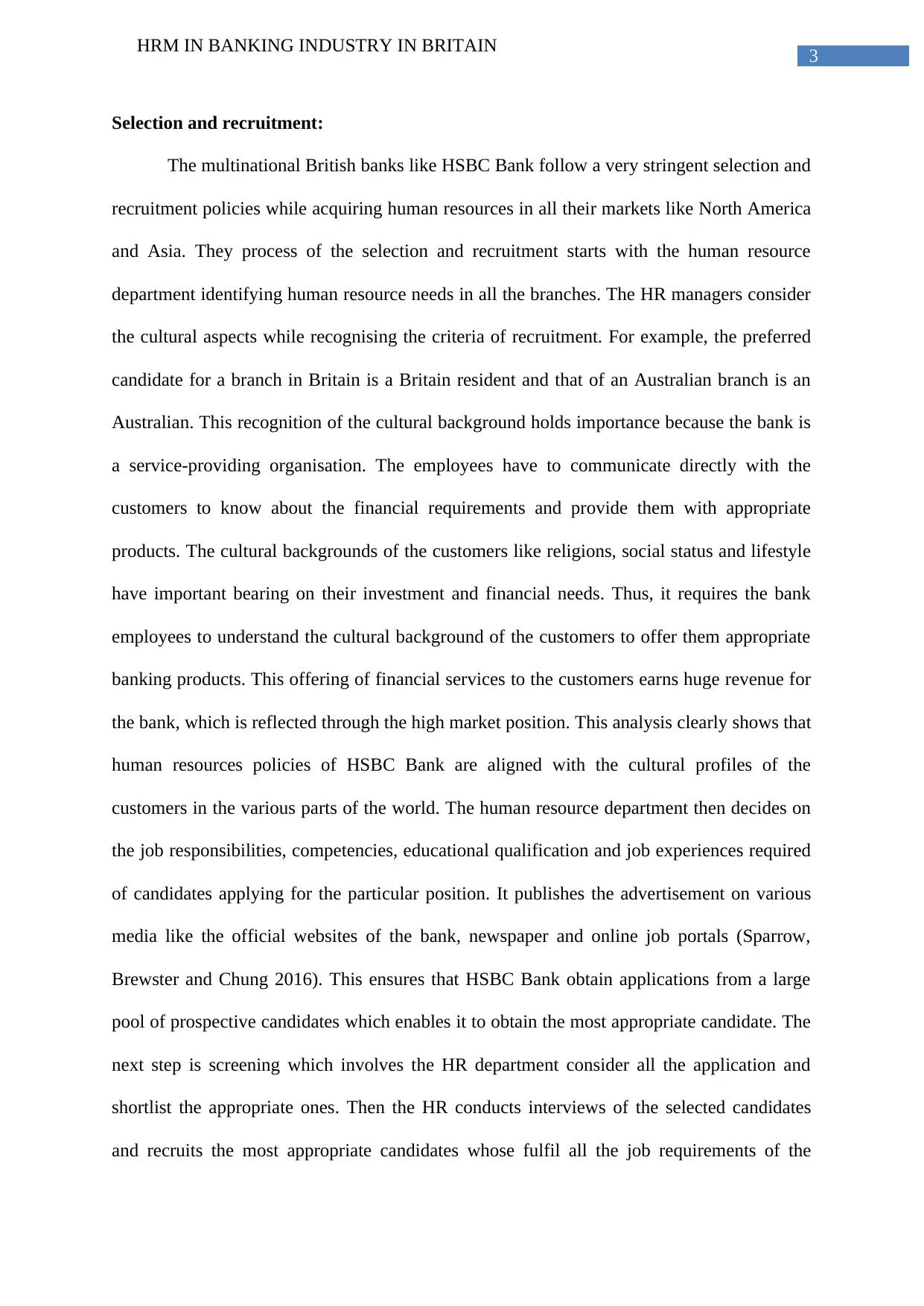
3
HRM IN BANKING INDUSTRY IN BRITAIN
Selection and recruitment:
The multinational British banks like HSBC Bank follow a very stringent selection and
recruitment policies while acquiring human resources in all their markets like North America
and Asia. They process of the selection and recruitment starts with the human resource
department identifying human resource needs in all the branches. The HR managers consider
the cultural aspects while recognising the criteria of recruitment. For example, the preferred
candidate for a branch in Britain is a Britain resident and that of an Australian branch is an
Australian. This recognition of the cultural background holds importance because the bank is
a service-providing organisation. The employees have to communicate directly with the
customers to know about the financial requirements and provide them with appropriate
products. The cultural backgrounds of the customers like religions, social status and lifestyle
have important bearing on their investment and financial needs. Thus, it requires the bank
employees to understand the cultural background of the customers to offer them appropriate
banking products. This offering of financial services to the customers earns huge revenue for
the bank, which is reflected through the high market position. This analysis clearly shows that
human resources policies of HSBC Bank are aligned with the cultural profiles of the
customers in the various parts of the world. The human resource department then decides on
the job responsibilities, competencies, educational qualification and job experiences required
of candidates applying for the particular position. It publishes the advertisement on various
media like the official websites of the bank, newspaper and online job portals (Sparrow,
Brewster and Chung 2016). This ensures that HSBC Bank obtain applications from a large
pool of prospective candidates which enables it to obtain the most appropriate candidate. The
next step is screening which involves the HR department consider all the application and
shortlist the appropriate ones. Then the HR conducts interviews of the selected candidates
and recruits the most appropriate candidates whose fulfil all the job requirements of the
HRM IN BANKING INDUSTRY IN BRITAIN
Selection and recruitment:
The multinational British banks like HSBC Bank follow a very stringent selection and
recruitment policies while acquiring human resources in all their markets like North America
and Asia. They process of the selection and recruitment starts with the human resource
department identifying human resource needs in all the branches. The HR managers consider
the cultural aspects while recognising the criteria of recruitment. For example, the preferred
candidate for a branch in Britain is a Britain resident and that of an Australian branch is an
Australian. This recognition of the cultural background holds importance because the bank is
a service-providing organisation. The employees have to communicate directly with the
customers to know about the financial requirements and provide them with appropriate
products. The cultural backgrounds of the customers like religions, social status and lifestyle
have important bearing on their investment and financial needs. Thus, it requires the bank
employees to understand the cultural background of the customers to offer them appropriate
banking products. This offering of financial services to the customers earns huge revenue for
the bank, which is reflected through the high market position. This analysis clearly shows that
human resources policies of HSBC Bank are aligned with the cultural profiles of the
customers in the various parts of the world. The human resource department then decides on
the job responsibilities, competencies, educational qualification and job experiences required
of candidates applying for the particular position. It publishes the advertisement on various
media like the official websites of the bank, newspaper and online job portals (Sparrow,
Brewster and Chung 2016). This ensures that HSBC Bank obtain applications from a large
pool of prospective candidates which enables it to obtain the most appropriate candidate. The
next step is screening which involves the HR department consider all the application and
shortlist the appropriate ones. Then the HR conducts interviews of the selected candidates
and recruits the most appropriate candidates whose fulfil all the job requirements of the
Paraphrase This Document
Need a fresh take? Get an instant paraphrase of this document with our AI Paraphraser
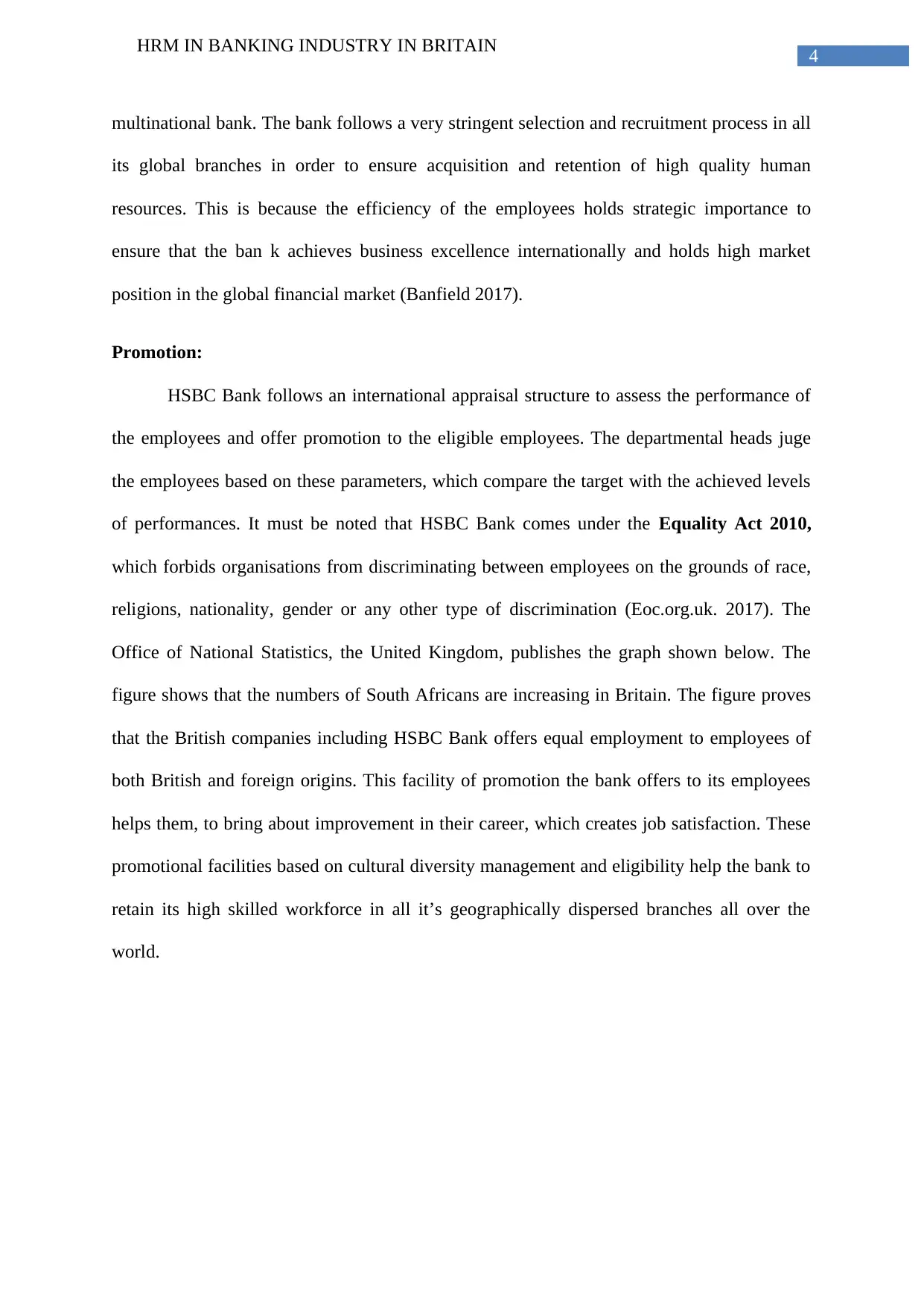
4
HRM IN BANKING INDUSTRY IN BRITAIN
multinational bank. The bank follows a very stringent selection and recruitment process in all
its global branches in order to ensure acquisition and retention of high quality human
resources. This is because the efficiency of the employees holds strategic importance to
ensure that the ban k achieves business excellence internationally and holds high market
position in the global financial market (Banfield 2017).
Promotion:
HSBC Bank follows an international appraisal structure to assess the performance of
the employees and offer promotion to the eligible employees. The departmental heads juge
the employees based on these parameters, which compare the target with the achieved levels
of performances. It must be noted that HSBC Bank comes under the Equality Act 2010,
which forbids organisations from discriminating between employees on the grounds of race,
religions, nationality, gender or any other type of discrimination (Eoc.org.uk. 2017). The
Office of National Statistics, the United Kingdom, publishes the graph shown below. The
figure shows that the numbers of South Africans are increasing in Britain. The figure proves
that the British companies including HSBC Bank offers equal employment to employees of
both British and foreign origins. This facility of promotion the bank offers to its employees
helps them, to bring about improvement in their career, which creates job satisfaction. These
promotional facilities based on cultural diversity management and eligibility help the bank to
retain its high skilled workforce in all it’s geographically dispersed branches all over the
world.
HRM IN BANKING INDUSTRY IN BRITAIN
multinational bank. The bank follows a very stringent selection and recruitment process in all
its global branches in order to ensure acquisition and retention of high quality human
resources. This is because the efficiency of the employees holds strategic importance to
ensure that the ban k achieves business excellence internationally and holds high market
position in the global financial market (Banfield 2017).
Promotion:
HSBC Bank follows an international appraisal structure to assess the performance of
the employees and offer promotion to the eligible employees. The departmental heads juge
the employees based on these parameters, which compare the target with the achieved levels
of performances. It must be noted that HSBC Bank comes under the Equality Act 2010,
which forbids organisations from discriminating between employees on the grounds of race,
religions, nationality, gender or any other type of discrimination (Eoc.org.uk. 2017). The
Office of National Statistics, the United Kingdom, publishes the graph shown below. The
figure shows that the numbers of South Africans are increasing in Britain. The figure proves
that the British companies including HSBC Bank offers equal employment to employees of
both British and foreign origins. This facility of promotion the bank offers to its employees
helps them, to bring about improvement in their career, which creates job satisfaction. These
promotional facilities based on cultural diversity management and eligibility help the bank to
retain its high skilled workforce in all it’s geographically dispersed branches all over the
world.
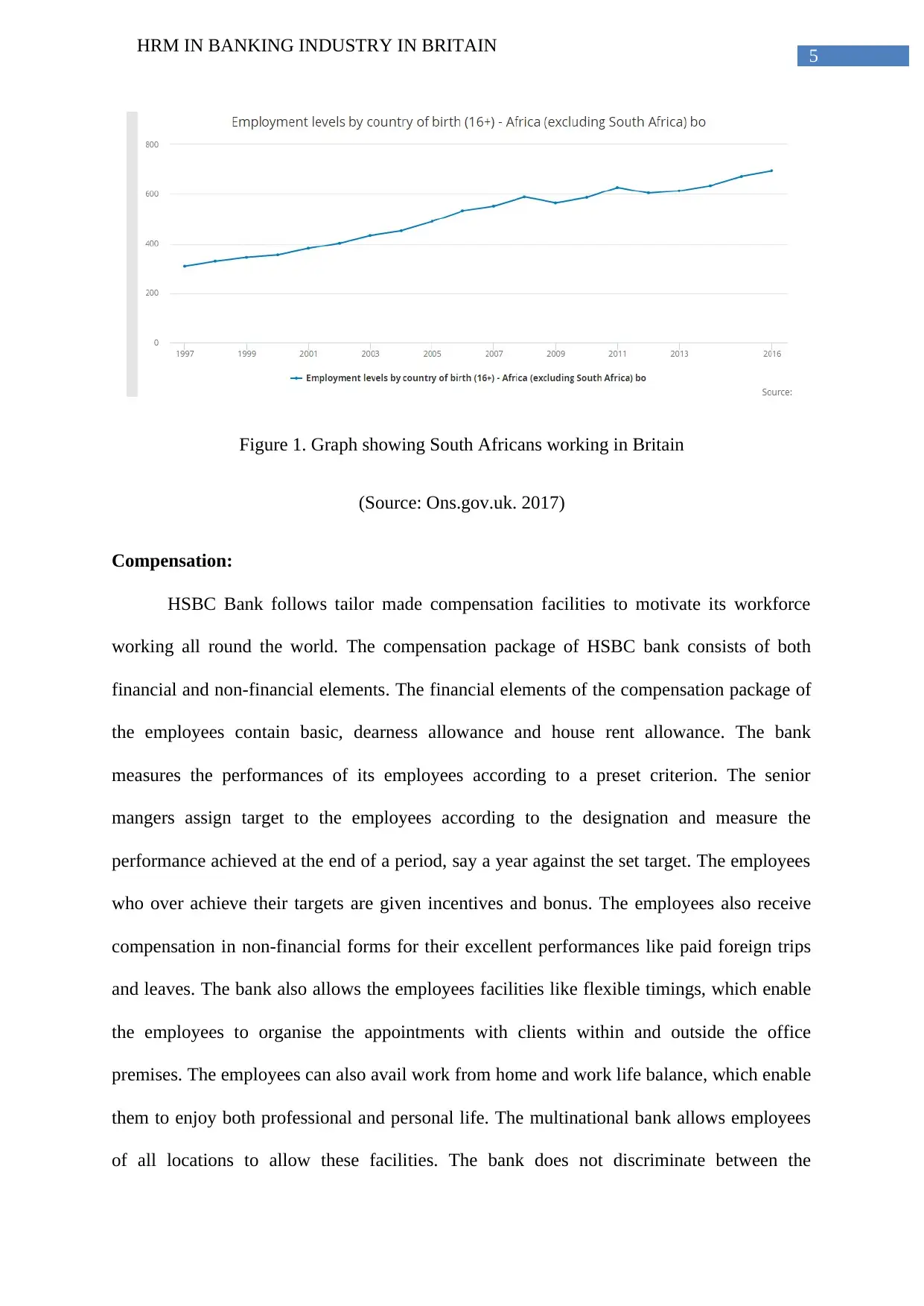
5
HRM IN BANKING INDUSTRY IN BRITAIN
Figure 1. Graph showing South Africans working in Britain
(Source: Ons.gov.uk. 2017)
Compensation:
HSBC Bank follows tailor made compensation facilities to motivate its workforce
working all round the world. The compensation package of HSBC bank consists of both
financial and non-financial elements. The financial elements of the compensation package of
the employees contain basic, dearness allowance and house rent allowance. The bank
measures the performances of its employees according to a preset criterion. The senior
mangers assign target to the employees according to the designation and measure the
performance achieved at the end of a period, say a year against the set target. The employees
who over achieve their targets are given incentives and bonus. The employees also receive
compensation in non-financial forms for their excellent performances like paid foreign trips
and leaves. The bank also allows the employees facilities like flexible timings, which enable
the employees to organise the appointments with clients within and outside the office
premises. The employees can also avail work from home and work life balance, which enable
them to enjoy both professional and personal life. The multinational bank allows employees
of all locations to allow these facilities. The bank does not discriminate between the
HRM IN BANKING INDUSTRY IN BRITAIN
Figure 1. Graph showing South Africans working in Britain
(Source: Ons.gov.uk. 2017)
Compensation:
HSBC Bank follows tailor made compensation facilities to motivate its workforce
working all round the world. The compensation package of HSBC bank consists of both
financial and non-financial elements. The financial elements of the compensation package of
the employees contain basic, dearness allowance and house rent allowance. The bank
measures the performances of its employees according to a preset criterion. The senior
mangers assign target to the employees according to the designation and measure the
performance achieved at the end of a period, say a year against the set target. The employees
who over achieve their targets are given incentives and bonus. The employees also receive
compensation in non-financial forms for their excellent performances like paid foreign trips
and leaves. The bank also allows the employees facilities like flexible timings, which enable
the employees to organise the appointments with clients within and outside the office
premises. The employees can also avail work from home and work life balance, which enable
them to enjoy both professional and personal life. The multinational bank allows employees
of all locations to allow these facilities. The bank does not discriminate between the
⊘ This is a preview!⊘
Do you want full access?
Subscribe today to unlock all pages.

Trusted by 1+ million students worldwide
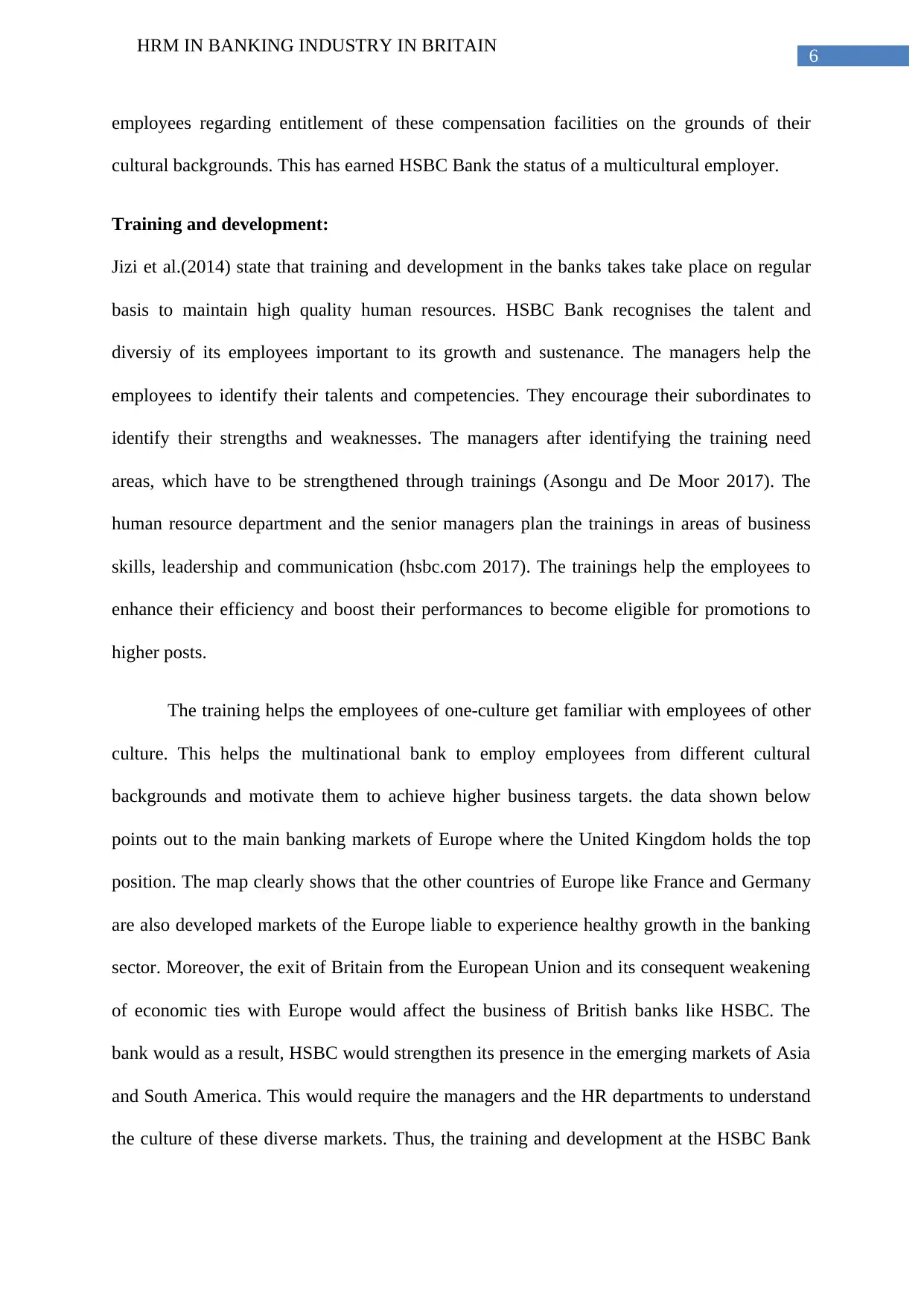
6
HRM IN BANKING INDUSTRY IN BRITAIN
employees regarding entitlement of these compensation facilities on the grounds of their
cultural backgrounds. This has earned HSBC Bank the status of a multicultural employer.
Training and development:
Jizi et al.(2014) state that training and development in the banks takes take place on regular
basis to maintain high quality human resources. HSBC Bank recognises the talent and
diversiy of its employees important to its growth and sustenance. The managers help the
employees to identify their talents and competencies. They encourage their subordinates to
identify their strengths and weaknesses. The managers after identifying the training need
areas, which have to be strengthened through trainings (Asongu and De Moor 2017). The
human resource department and the senior managers plan the trainings in areas of business
skills, leadership and communication (hsbc.com 2017). The trainings help the employees to
enhance their efficiency and boost their performances to become eligible for promotions to
higher posts.
The training helps the employees of one-culture get familiar with employees of other
culture. This helps the multinational bank to employ employees from different cultural
backgrounds and motivate them to achieve higher business targets. the data shown below
points out to the main banking markets of Europe where the United Kingdom holds the top
position. The map clearly shows that the other countries of Europe like France and Germany
are also developed markets of the Europe liable to experience healthy growth in the banking
sector. Moreover, the exit of Britain from the European Union and its consequent weakening
of economic ties with Europe would affect the business of British banks like HSBC. The
bank would as a result, HSBC would strengthen its presence in the emerging markets of Asia
and South America. This would require the managers and the HR departments to understand
the culture of these diverse markets. Thus, the training and development at the HSBC Bank
HRM IN BANKING INDUSTRY IN BRITAIN
employees regarding entitlement of these compensation facilities on the grounds of their
cultural backgrounds. This has earned HSBC Bank the status of a multicultural employer.
Training and development:
Jizi et al.(2014) state that training and development in the banks takes take place on regular
basis to maintain high quality human resources. HSBC Bank recognises the talent and
diversiy of its employees important to its growth and sustenance. The managers help the
employees to identify their talents and competencies. They encourage their subordinates to
identify their strengths and weaknesses. The managers after identifying the training need
areas, which have to be strengthened through trainings (Asongu and De Moor 2017). The
human resource department and the senior managers plan the trainings in areas of business
skills, leadership and communication (hsbc.com 2017). The trainings help the employees to
enhance their efficiency and boost their performances to become eligible for promotions to
higher posts.
The training helps the employees of one-culture get familiar with employees of other
culture. This helps the multinational bank to employ employees from different cultural
backgrounds and motivate them to achieve higher business targets. the data shown below
points out to the main banking markets of Europe where the United Kingdom holds the top
position. The map clearly shows that the other countries of Europe like France and Germany
are also developed markets of the Europe liable to experience healthy growth in the banking
sector. Moreover, the exit of Britain from the European Union and its consequent weakening
of economic ties with Europe would affect the business of British banks like HSBC. The
bank would as a result, HSBC would strengthen its presence in the emerging markets of Asia
and South America. This would require the managers and the HR departments to understand
the culture of these diverse markets. Thus, the training and development at the HSBC Bank
Paraphrase This Document
Need a fresh take? Get an instant paraphrase of this document with our AI Paraphraser
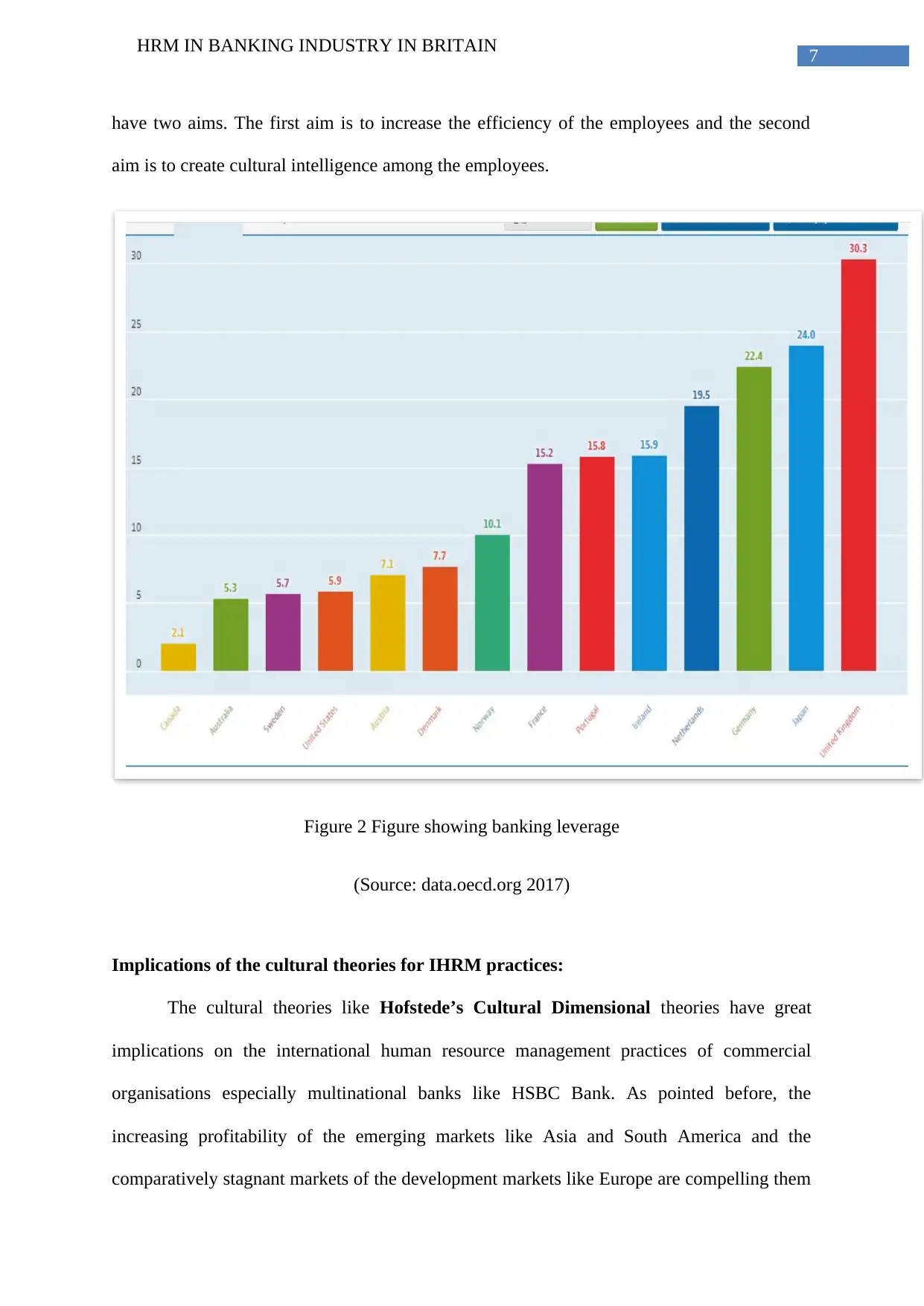
7
HRM IN BANKING INDUSTRY IN BRITAIN
have two aims. The first aim is to increase the efficiency of the employees and the second
aim is to create cultural intelligence among the employees.
Figure 2 Figure showing banking leverage
(Source: data.oecd.org 2017)
Implications of the cultural theories for IHRM practices:
The cultural theories like Hofstede’s Cultural Dimensional theories have great
implications on the international human resource management practices of commercial
organisations especially multinational banks like HSBC Bank. As pointed before, the
increasing profitability of the emerging markets like Asia and South America and the
comparatively stagnant markets of the development markets like Europe are compelling them
HRM IN BANKING INDUSTRY IN BRITAIN
have two aims. The first aim is to increase the efficiency of the employees and the second
aim is to create cultural intelligence among the employees.
Figure 2 Figure showing banking leverage
(Source: data.oecd.org 2017)
Implications of the cultural theories for IHRM practices:
The cultural theories like Hofstede’s Cultural Dimensional theories have great
implications on the international human resource management practices of commercial
organisations especially multinational banks like HSBC Bank. As pointed before, the
increasing profitability of the emerging markets like Asia and South America and the
comparatively stagnant markets of the development markets like Europe are compelling them
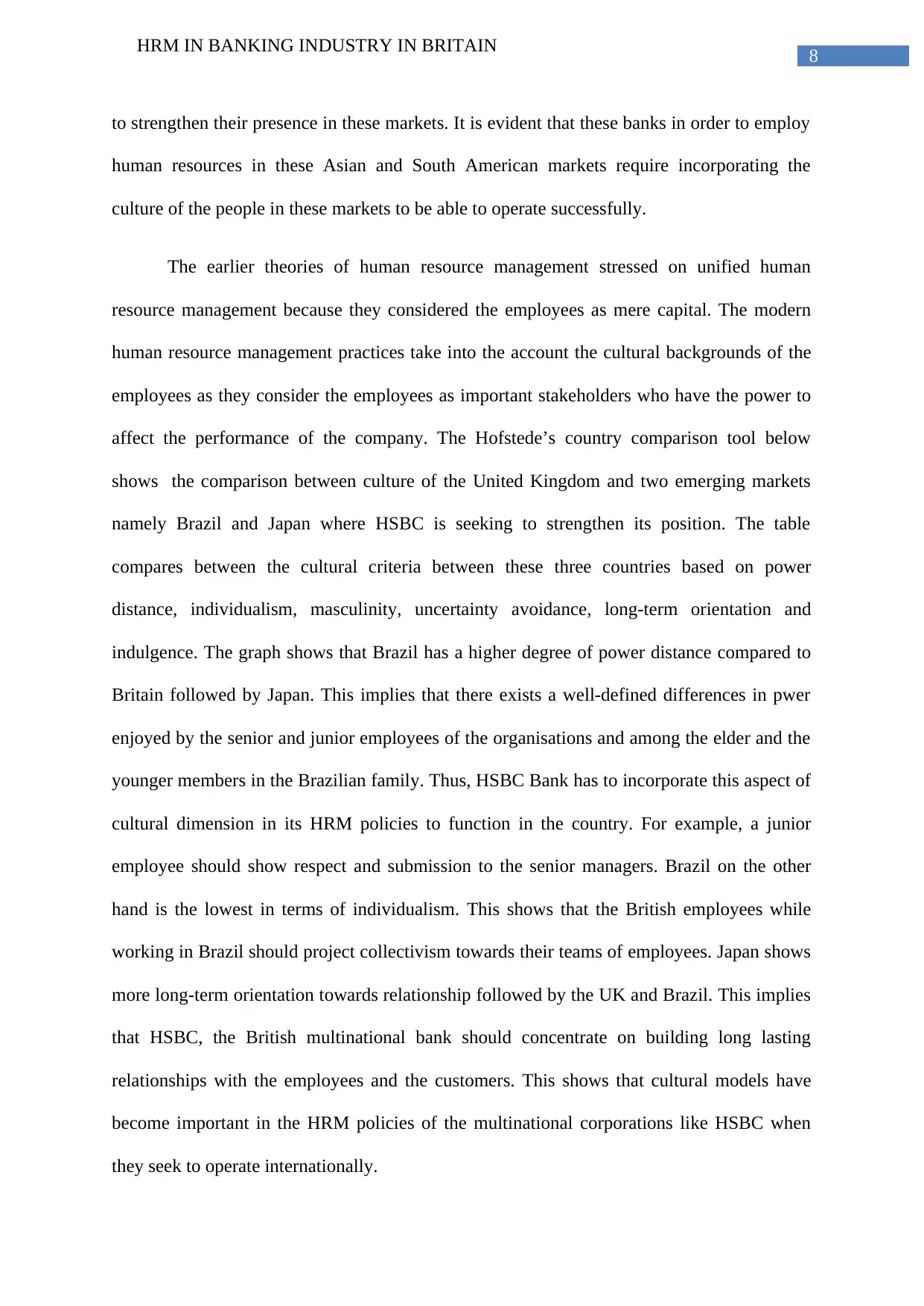
8
HRM IN BANKING INDUSTRY IN BRITAIN
to strengthen their presence in these markets. It is evident that these banks in order to employ
human resources in these Asian and South American markets require incorporating the
culture of the people in these markets to be able to operate successfully.
The earlier theories of human resource management stressed on unified human
resource management because they considered the employees as mere capital. The modern
human resource management practices take into the account the cultural backgrounds of the
employees as they consider the employees as important stakeholders who have the power to
affect the performance of the company. The Hofstede’s country comparison tool below
shows the comparison between culture of the United Kingdom and two emerging markets
namely Brazil and Japan where HSBC is seeking to strengthen its position. The table
compares between the cultural criteria between these three countries based on power
distance, individualism, masculinity, uncertainty avoidance, long-term orientation and
indulgence. The graph shows that Brazil has a higher degree of power distance compared to
Britain followed by Japan. This implies that there exists a well-defined differences in pwer
enjoyed by the senior and junior employees of the organisations and among the elder and the
younger members in the Brazilian family. Thus, HSBC Bank has to incorporate this aspect of
cultural dimension in its HRM policies to function in the country. For example, a junior
employee should show respect and submission to the senior managers. Brazil on the other
hand is the lowest in terms of individualism. This shows that the British employees while
working in Brazil should project collectivism towards their teams of employees. Japan shows
more long-term orientation towards relationship followed by the UK and Brazil. This implies
that HSBC, the British multinational bank should concentrate on building long lasting
relationships with the employees and the customers. This shows that cultural models have
become important in the HRM policies of the multinational corporations like HSBC when
they seek to operate internationally.
HRM IN BANKING INDUSTRY IN BRITAIN
to strengthen their presence in these markets. It is evident that these banks in order to employ
human resources in these Asian and South American markets require incorporating the
culture of the people in these markets to be able to operate successfully.
The earlier theories of human resource management stressed on unified human
resource management because they considered the employees as mere capital. The modern
human resource management practices take into the account the cultural backgrounds of the
employees as they consider the employees as important stakeholders who have the power to
affect the performance of the company. The Hofstede’s country comparison tool below
shows the comparison between culture of the United Kingdom and two emerging markets
namely Brazil and Japan where HSBC is seeking to strengthen its position. The table
compares between the cultural criteria between these three countries based on power
distance, individualism, masculinity, uncertainty avoidance, long-term orientation and
indulgence. The graph shows that Brazil has a higher degree of power distance compared to
Britain followed by Japan. This implies that there exists a well-defined differences in pwer
enjoyed by the senior and junior employees of the organisations and among the elder and the
younger members in the Brazilian family. Thus, HSBC Bank has to incorporate this aspect of
cultural dimension in its HRM policies to function in the country. For example, a junior
employee should show respect and submission to the senior managers. Brazil on the other
hand is the lowest in terms of individualism. This shows that the British employees while
working in Brazil should project collectivism towards their teams of employees. Japan shows
more long-term orientation towards relationship followed by the UK and Brazil. This implies
that HSBC, the British multinational bank should concentrate on building long lasting
relationships with the employees and the customers. This shows that cultural models have
become important in the HRM policies of the multinational corporations like HSBC when
they seek to operate internationally.
⊘ This is a preview!⊘
Do you want full access?
Subscribe today to unlock all pages.

Trusted by 1+ million students worldwide
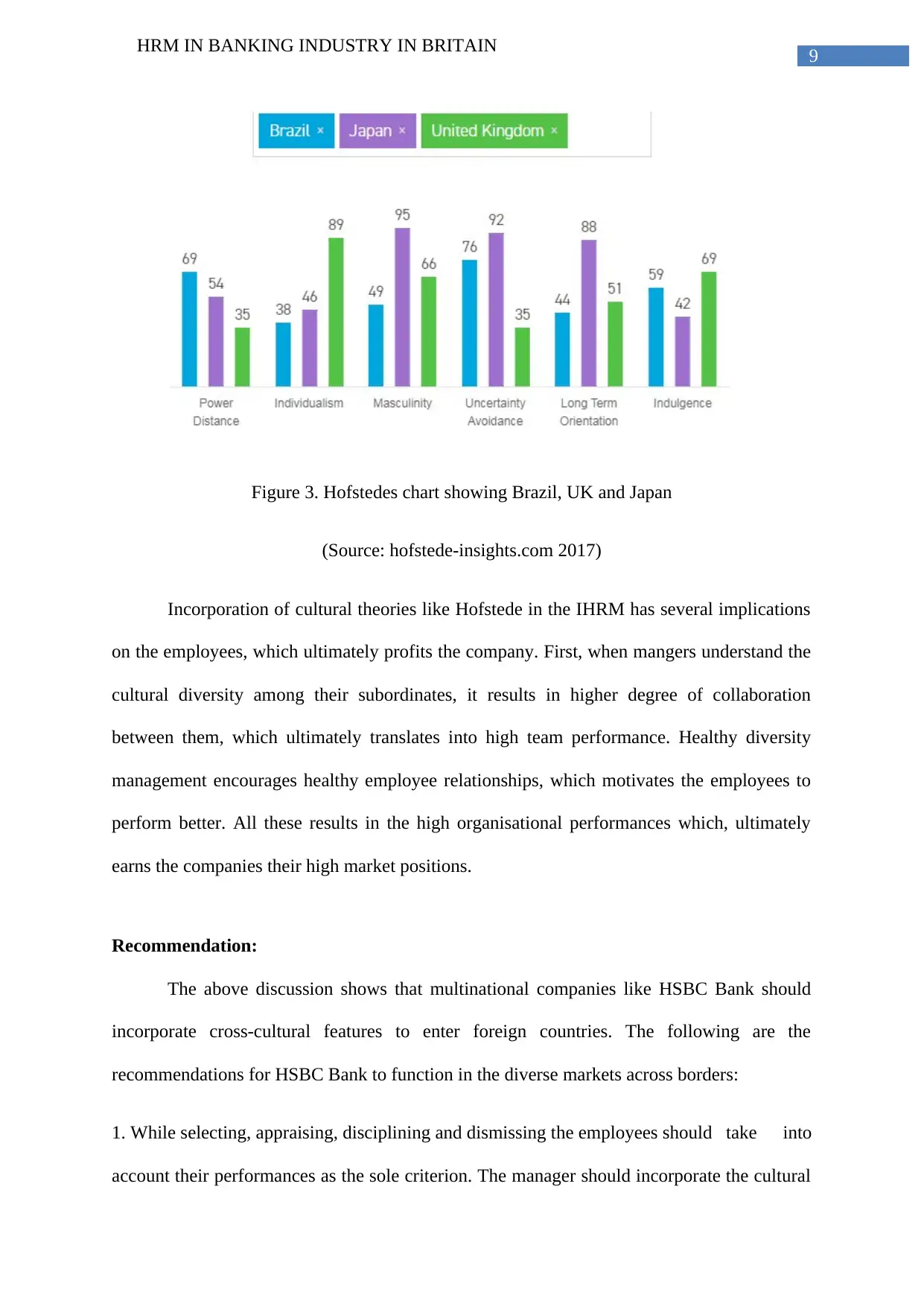
9
HRM IN BANKING INDUSTRY IN BRITAIN
Figure 3. Hofstedes chart showing Brazil, UK and Japan
(Source: hofstede-insights.com 2017)
Incorporation of cultural theories like Hofstede in the IHRM has several implications
on the employees, which ultimately profits the company. First, when mangers understand the
cultural diversity among their subordinates, it results in higher degree of collaboration
between them, which ultimately translates into high team performance. Healthy diversity
management encourages healthy employee relationships, which motivates the employees to
perform better. All these results in the high organisational performances which, ultimately
earns the companies their high market positions.
Recommendation:
The above discussion shows that multinational companies like HSBC Bank should
incorporate cross-cultural features to enter foreign countries. The following are the
recommendations for HSBC Bank to function in the diverse markets across borders:
1. While selecting, appraising, disciplining and dismissing the employees should take into
account their performances as the sole criterion. The manager should incorporate the cultural
HRM IN BANKING INDUSTRY IN BRITAIN
Figure 3. Hofstedes chart showing Brazil, UK and Japan
(Source: hofstede-insights.com 2017)
Incorporation of cultural theories like Hofstede in the IHRM has several implications
on the employees, which ultimately profits the company. First, when mangers understand the
cultural diversity among their subordinates, it results in higher degree of collaboration
between them, which ultimately translates into high team performance. Healthy diversity
management encourages healthy employee relationships, which motivates the employees to
perform better. All these results in the high organisational performances which, ultimately
earns the companies their high market positions.
Recommendation:
The above discussion shows that multinational companies like HSBC Bank should
incorporate cross-cultural features to enter foreign countries. The following are the
recommendations for HSBC Bank to function in the diverse markets across borders:
1. While selecting, appraising, disciplining and dismissing the employees should take into
account their performances as the sole criterion. The manager should incorporate the cultural
Paraphrase This Document
Need a fresh take? Get an instant paraphrase of this document with our AI Paraphraser
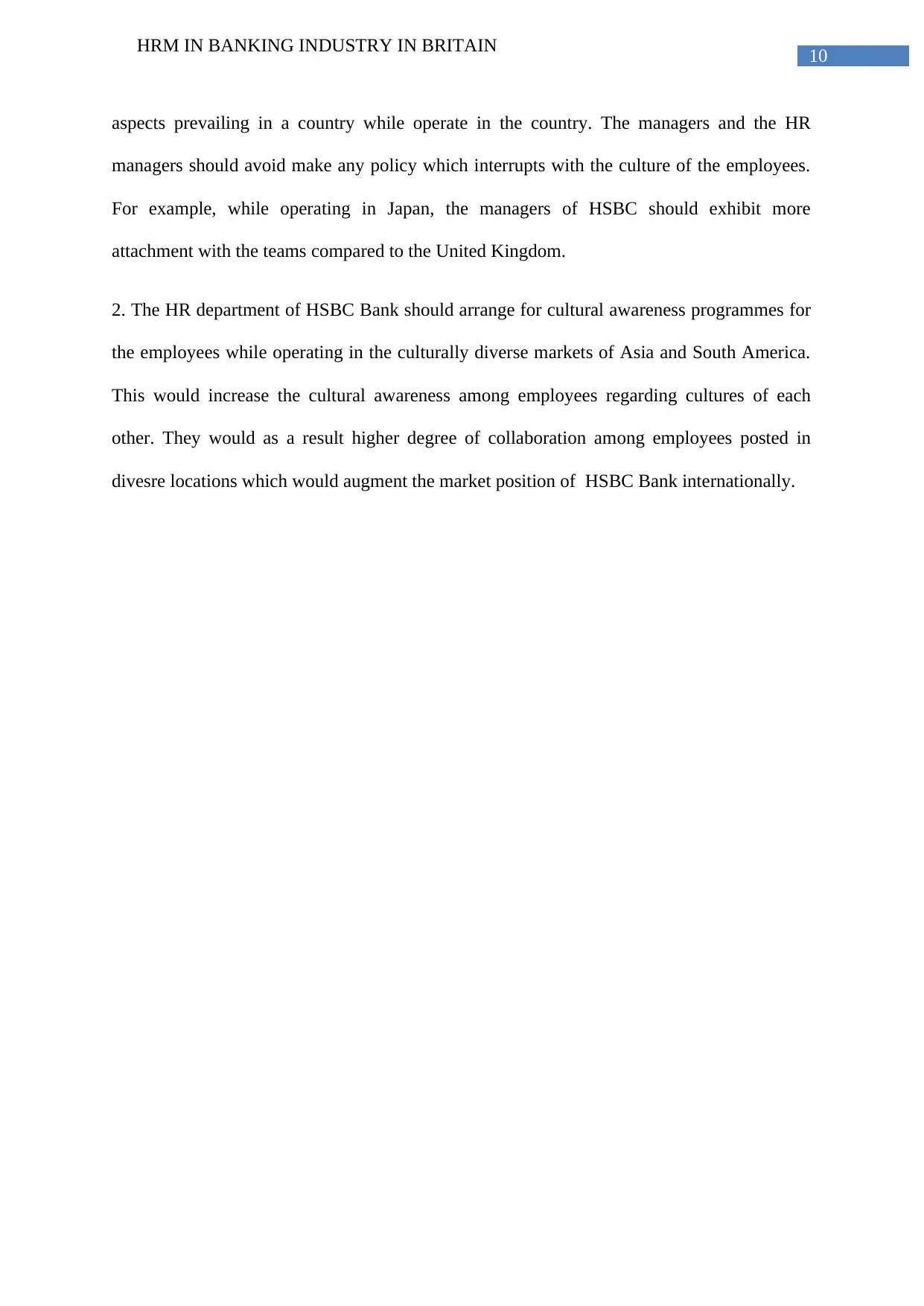
10
HRM IN BANKING INDUSTRY IN BRITAIN
aspects prevailing in a country while operate in the country. The managers and the HR
managers should avoid make any policy which interrupts with the culture of the employees.
For example, while operating in Japan, the managers of HSBC should exhibit more
attachment with the teams compared to the United Kingdom.
2. The HR department of HSBC Bank should arrange for cultural awareness programmes for
the employees while operating in the culturally diverse markets of Asia and South America.
This would increase the cultural awareness among employees regarding cultures of each
other. They would as a result higher degree of collaboration among employees posted in
divesre locations which would augment the market position of HSBC Bank internationally.
HRM IN BANKING INDUSTRY IN BRITAIN
aspects prevailing in a country while operate in the country. The managers and the HR
managers should avoid make any policy which interrupts with the culture of the employees.
For example, while operating in Japan, the managers of HSBC should exhibit more
attachment with the teams compared to the United Kingdom.
2. The HR department of HSBC Bank should arrange for cultural awareness programmes for
the employees while operating in the culturally diverse markets of Asia and South America.
This would increase the cultural awareness among employees regarding cultures of each
other. They would as a result higher degree of collaboration among employees posted in
divesre locations which would augment the market position of HSBC Bank internationally.
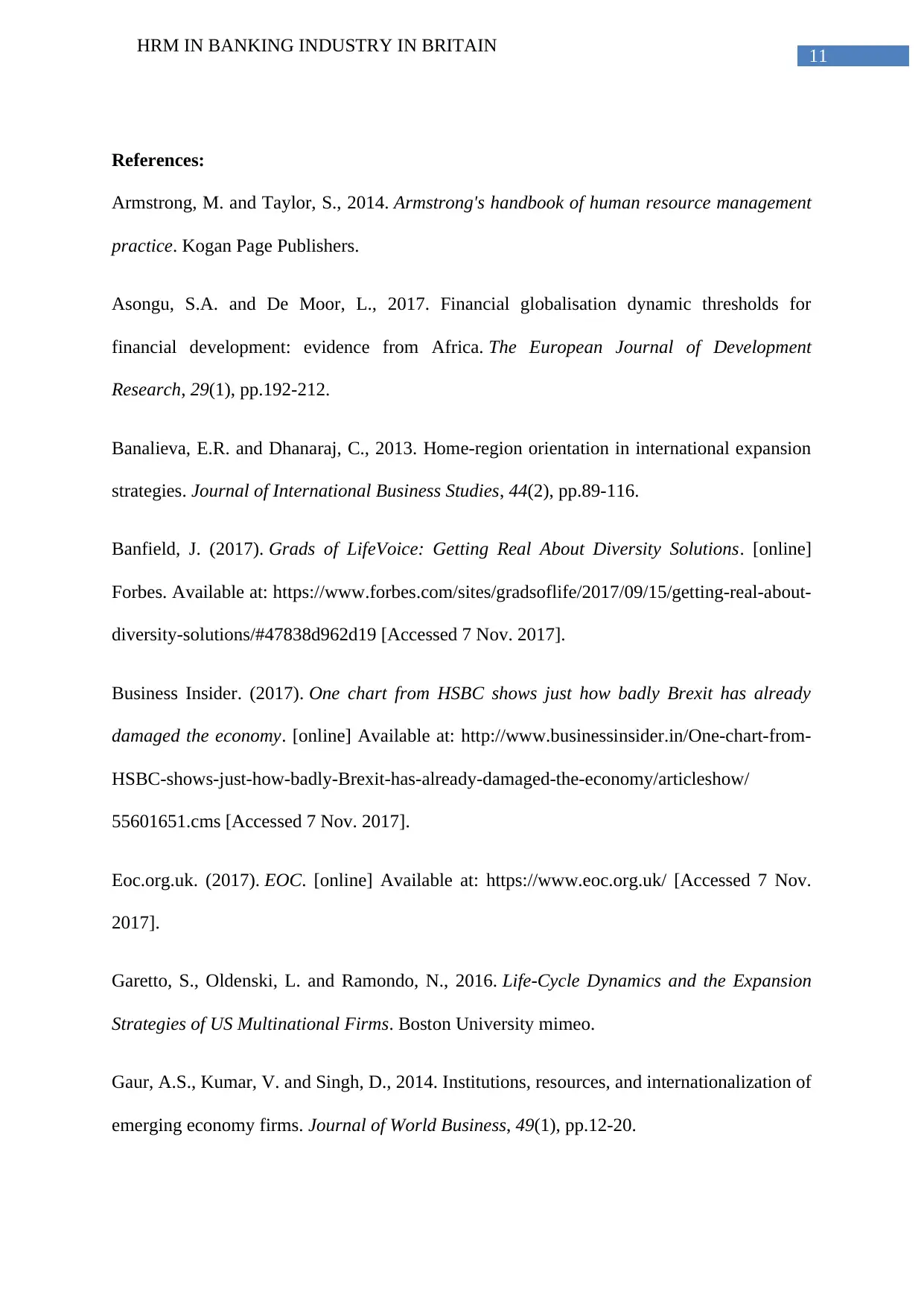
11
HRM IN BANKING INDUSTRY IN BRITAIN
References:
Armstrong, M. and Taylor, S., 2014. Armstrong's handbook of human resource management
practice. Kogan Page Publishers.
Asongu, S.A. and De Moor, L., 2017. Financial globalisation dynamic thresholds for
financial development: evidence from Africa. The European Journal of Development
Research, 29(1), pp.192-212.
Banalieva, E.R. and Dhanaraj, C., 2013. Home-region orientation in international expansion
strategies. Journal of International Business Studies, 44(2), pp.89-116.
Banfield, J. (2017). Grads of LifeVoice: Getting Real About Diversity Solutions. [online]
Forbes. Available at: https://www.forbes.com/sites/gradsoflife/2017/09/15/getting-real-about-
diversity-solutions/#47838d962d19 [Accessed 7 Nov. 2017].
Business Insider. (2017). One chart from HSBC shows just how badly Brexit has already
damaged the economy. [online] Available at: http://www.businessinsider.in/One-chart-from-
HSBC-shows-just-how-badly-Brexit-has-already-damaged-the-economy/articleshow/
55601651.cms [Accessed 7 Nov. 2017].
Eoc.org.uk. (2017). EOC. [online] Available at: https://www.eoc.org.uk/ [Accessed 7 Nov.
2017].
Garetto, S., Oldenski, L. and Ramondo, N., 2016. Life-Cycle Dynamics and the Expansion
Strategies of US Multinational Firms. Boston University mimeo.
Gaur, A.S., Kumar, V. and Singh, D., 2014. Institutions, resources, and internationalization of
emerging economy firms. Journal of World Business, 49(1), pp.12-20.
HRM IN BANKING INDUSTRY IN BRITAIN
References:
Armstrong, M. and Taylor, S., 2014. Armstrong's handbook of human resource management
practice. Kogan Page Publishers.
Asongu, S.A. and De Moor, L., 2017. Financial globalisation dynamic thresholds for
financial development: evidence from Africa. The European Journal of Development
Research, 29(1), pp.192-212.
Banalieva, E.R. and Dhanaraj, C., 2013. Home-region orientation in international expansion
strategies. Journal of International Business Studies, 44(2), pp.89-116.
Banfield, J. (2017). Grads of LifeVoice: Getting Real About Diversity Solutions. [online]
Forbes. Available at: https://www.forbes.com/sites/gradsoflife/2017/09/15/getting-real-about-
diversity-solutions/#47838d962d19 [Accessed 7 Nov. 2017].
Business Insider. (2017). One chart from HSBC shows just how badly Brexit has already
damaged the economy. [online] Available at: http://www.businessinsider.in/One-chart-from-
HSBC-shows-just-how-badly-Brexit-has-already-damaged-the-economy/articleshow/
55601651.cms [Accessed 7 Nov. 2017].
Eoc.org.uk. (2017). EOC. [online] Available at: https://www.eoc.org.uk/ [Accessed 7 Nov.
2017].
Garetto, S., Oldenski, L. and Ramondo, N., 2016. Life-Cycle Dynamics and the Expansion
Strategies of US Multinational Firms. Boston University mimeo.
Gaur, A.S., Kumar, V. and Singh, D., 2014. Institutions, resources, and internationalization of
emerging economy firms. Journal of World Business, 49(1), pp.12-20.
⊘ This is a preview!⊘
Do you want full access?
Subscribe today to unlock all pages.

Trusted by 1+ million students worldwide
1 out of 13
Related Documents
Your All-in-One AI-Powered Toolkit for Academic Success.
+13062052269
info@desklib.com
Available 24*7 on WhatsApp / Email
![[object Object]](/_next/static/media/star-bottom.7253800d.svg)
Unlock your academic potential
Copyright © 2020–2026 A2Z Services. All Rights Reserved. Developed and managed by ZUCOL.





